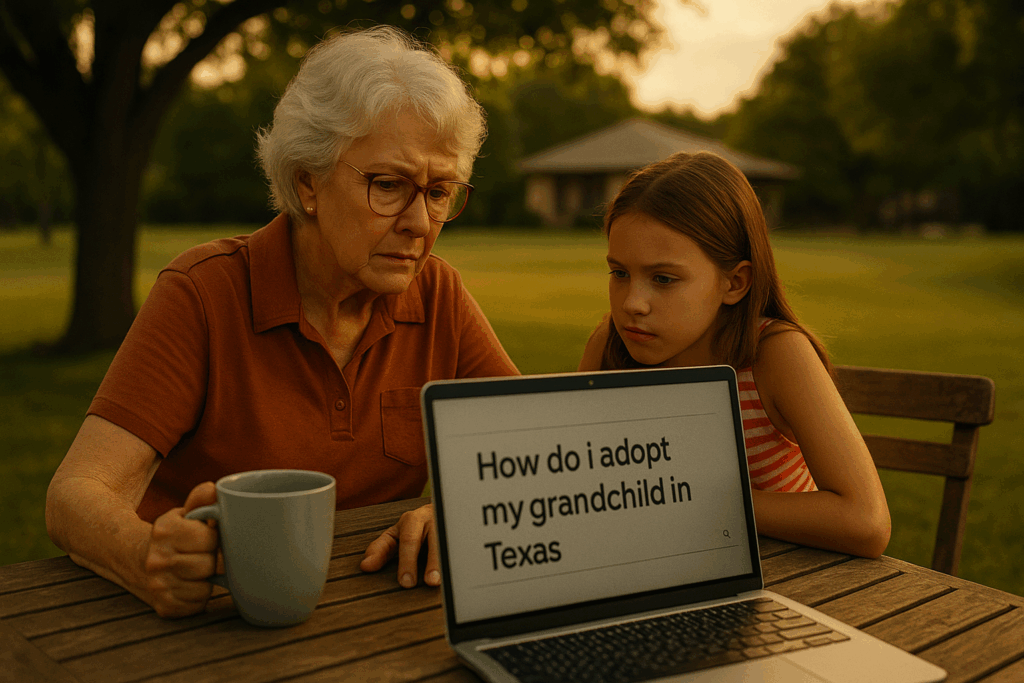
Ever find yourself Googling “How do I adopt my grandchild in Texas” after a family dinner that felt more like a courtroom drama than a holiday? You’re not alone—and if you’re here, chances are life threw you a plot twist you didn’t see coming. Maybe it was a crisis, maybe it was a slow unraveling, but now you’re not just Grandma or Grandpa—you’re the steady hand, the safe place, the one who steps up when others can’t.
So, what’s next? Can you really adopt your grandchild in Texas? Short answer: yes, you absolutely can. But like any good Texas-sized adventure, it involves some planning, a little paperwork, and a whole lot of heart.
In this article, we’re walking you through the full adoption process—legal steps, emotional considerations, and all the practical tips to make the road a little smoother. We’ll explore everything from temporary custody versus permanent adoption, to what happens if CPS is involved, how to keep your grandchild enrolled in their current school, and even what to do if you’re a single grandparent or live out of state.
If you’re worried about courtroom lingo, don’t be. At The Law Office of Bryan Fagan, PLLC, we believe in educating families and protecting futures—in plain English. So, grab your coffee (or sweet tea—we’re in Texas, after all), and let’s dive in. Because your grandchild’s future is worth fighting for, and we’re here to help you every step of the way.
Key Takeaways
- Grandparent adoption in Texas grants full parental rights and responsibilities, allowing grandparents to provide stability, make medical and educational decisions, and ensure inheritance rights for their grandchildren.
- The adoption process requires legal criteria such as stable home conditions, parental consent, and if necessary, evidence of the biological parents’ unfitness, with an essential focus on the child’s best interests.
- Involuntary termination of parental rights and court procedures are complex aspects of adoption, requiring thorough documentation and legal representation to navigate effectively.

Your Adoption Journey Starts Here
Don’t navigate the adoption process alone. Schedule a consultation today and receive the expert guidance and support you need to build the family of your dreams.
Understanding Grandparent Adoption in Texas
How Do I Adopt My Grandchild in Texas? For many grandparents, this question marks the beginning of a journey to provide a child with lasting stability, love, and legal protection. Under Texas Family Code § 162.001, adoption grants grandparents full parental rights—giving them the legal authority to make medical, educational, and everyday decisions on behalf of their grandchild. This legal shift isn’t just about paperwork—it’s about safeguarding a child’s future.
Adopting your grandchild means you can enroll them in school, authorize medical treatment, and ensure they have the same inheritance rights as any biological child. These legal protections create consistency for the child and peace of mind for the grandparent. As our family law team often advises, adoption is especially vital when parents are absent, unfit, or when CPS has become involved due to neglect or abuse.
Before the court can finalize an adoption, the biological parents’ rights must be legally terminated—either voluntarily or involuntarily—under Texas Family Code § 161.001. This step can be emotionally complex and procedurally challenging, especially without experienced legal counsel. Our attorneys are here to help grandparents navigate this sensitive process with compassion, clarity, and a deep understanding of Texas family law.
To learn more about the complete adoption process, explore our detailed blog: How Do I Adopt My Grandchild in Texas. You can also find additional guidance on related topics like how CPS cases impact custody. At The Law Office of Bryan Fagan, PLLC, we are committed to protecting your rights and building a secure, permanent home for the ones you love most.

Legal Criteria for Grandparent Adoption
Before moving forward with adoption, it’s important to fully understand the legal standards that apply when you’re asking, “How Do I Adopt My Grandchild in Texas?” According to Texas Family Code § 162.001(b)(1), a grandparent must demonstrate that the adoption is in the child’s best interest and that the biological parents’ rights have been legally terminated. This involves proving your ability to provide a stable, loving environment that meets your grandchild’s physical, emotional, and developmental needs.
Parental consent is often required for adoption in Texas. Under Texas Family Code § 161.103, this consent must be given through a signed affidavit. However, in situations involving abandonment, neglect, or unfitness, the court may terminate parental rights involuntarily under § 161.001(b). In these cases, the court’s decision is guided by the child’s safety and emotional well-being, not the preferences of the parents. Demonstrating that adoption serves the child’s best interest is key.
If you’re adopting a child with unique medical or developmental needs, you’ll want to review our companion article that explains what’s required under Texas law to adopt your special needs grandson. It’s a helpful resource for understanding additional considerations, including support services and potential legal accommodations.
As our family law team often advises, adoption cases involving grandparents can be highly emotional and legally complex. If you’re unsure where to start, we encourage you to explore our insights on grandparents’ rights and conservatorship to better understand how custody and adoption can overlap. Working with an experienced Texas family law attorney can ensure your case is handled with care, compassion, and legal precision.

Termination of Parental Rights
When exploring How Do I Adopt My Grandchild in Texas, one of the most pivotal legal steps is the termination of the biological parents’ rights. According to Texas Family Code § 161.001, this can occur either voluntarily—with a signed affidavit of relinquishment—or involuntarily, when the court finds that a parent’s conduct has placed the child at risk of harm. Voluntary termination typically involves the parent completing and signing a consent form that may be revocable for a period of time or irrevocable, depending on how it’s filed.
In situations where a parent refuses to relinquish rights, the court may pursue involuntary termination, but the standard is high. Texas law requires clear and convincing evidence that the parent’s behavior—such as abandonment, abuse, neglect, or endangerment—justifies cutting legal ties. Even in these difficult circumstances, the court’s ultimate measure is the best interest of the child, which is referenced throughout the Texas Family Code, particularly in § 153.002 and § 161.001(b).
Because this stage of the process carries significant emotional and legal weight, it’s crucial to handle it with precision. Missteps can delay your case or even result in dismissal. That’s why our attorneys recommend reviewing consent to adoption forms carefully, as they are a cornerstone of any voluntary relinquishment. Understanding how and when these forms must be filed can make a meaningful difference in your adoption timeline.
If you’re facing complications related to parental termination, especially in contested cases, our team encourages you to read more on navigating CPS involvement in grandparent custody cases. As always, the attorneys at The Law Office of Bryan Fagan, PLLC are committed to helping you protect your grandchild’s future while guiding you through every legal step with confidence and compassion.
Filing the Adoption Petition
Filing the adoption petition is a key step when navigating How Do I Adopt My Grandchild in Texas, and it involves much more than just submitting paperwork. Under Texas Family Code § 162.001–§ 162.009, the adoption process begins with obtaining the proper consent—either directly from the biological parents or through a court-ordered termination of their rights. Your petition must include critical documentation such as the child’s birth certificate, any existing court orders, and either signed consent forms or judicial proof that consent is no longer required.
Consent is a legal cornerstone in Texas adoptions. If the biological parents are alive and have not had their rights terminated, their permission is generally required unless an exception applies. You can learn more about who must consent to adoption and the legal nuances involved by reviewing this guide to understanding legal consent for adoption in Texas.
Once consent is secured or a termination has been ordered, the next step is completing a home study and passing background checks. These evaluations are used to confirm that your living environment is safe, stable, and capable of supporting your grandchild’s emotional and financial needs. These reviews are mandated by law and provide the court with an independent assessment of your ability to parent.
The adoption process typically includes one or more court hearings and culminates in a final decree of adoption. As our team at The Law Office of Bryan Fagan, PLLC often advises, it’s essential to be prepared for each legal milestone. For additional clarity on how home studies fit into the grandparent adoption timeline, you may want to explore our related post on adoption qualifications in Texas. With experienced legal guidance, this process becomes not only manageable but empowering—ensuring that your grandchild’s future is placed on a solid and secure foundation.

The Role of Home Studies and Background Checks
Home studies and background checks play a crucial role in the adoption process, serving as a thorough evaluation of your living environment and suitability as a caregiver. A qualified social worker will conduct the home study and home visits, assessing various aspects of your home, including living conditions, family dynamics, and overall healthy environment.
The home study also includes a financial assessment to ensure that you are capable of providing for your grandchild’s needs and understanding the financial benefits. Background checks are conducted to scrutinize any past criminal activity or history of child abuse, safeguarding the child’s welfare.
These assessments are vital in kinship placements to verify the safety and appropriateness of the home environment before the child is placed with relatives. Understanding the importance of these evaluations can help you prepare adequately and ensure a smooth adoption process.
Navigating Court Procedures
Navigating the courtroom is one of the more intimidating parts of answering the question, How Do I Adopt My Grandchild in Texas, but knowing what to expect can go a long way in easing anxiety. In any adoption hearing, the judge’s primary focus is the best interest of the child, as outlined in Texas Family Code § 153.002. This includes reviewing the home study, background checks, and any other supporting evidence to determine whether granting the adoption serves the child’s long-term stability and well-being.
If your grandchild is age 12 or older, their voice matters, too. According to Texas Family Code § 162.010, the child must provide formal consent to the adoption unless the court waives this requirement for valid reasons. It’s important to understand when and how this consent is needed, which is why we recommend reviewing this guide on when a child must consent to a Texas adoption for more detailed insight.
The courtroom process typically involves multiple steps—filing motions, preparing exhibits, and appearing before a judge. Each stage must be handled with care, especially in contested cases or those involving involuntary termination of parental rights. That’s where experienced legal counsel becomes essential. A skilled family law attorney can ensure all procedural requirements are met and that your case is presented with clarity and confidence.
As our team at The Law Office of Bryan Fagan, PLLC understands, this isn’t just paperwork—it’s your grandchild’s future. We’re here to support you through each legal step with compassion and precision. For further reading on how Texas courts assess child-related decisions, take a look at our post on how conservatorship affects school choices in custody cases. Our commitment remains steadfast: protecting your grandchild’s well-being while guiding you toward a lasting resolution.

Special Considerations
There are special considerations to keep in mind during the grandparent adoption process. If Child Protective Services (CPS) or family and protective services is involved, additional steps may be required to ensure the child’s safety and well-being. Kinship placements often involve more stringent evaluations to confirm that the home environment is healthy and supportive.
Another important factor is the child’s consent. In Texas, children aged 12 or older must provide their consent for the adoption to proceed. This ensures that the child’s voice is heard and respected in the decision-making process.
Understanding these relevant factors can help you navigate the complexities of the adoption process more effectively.
Real-Life Testimonials
Nothing speaks louder than real-life experiences. Take the story of a grandmother who traveled over 1000 miles to reconnect with her granddaughter after losing contact due to a family tragedy. Her determination and courage are a testament to the lengths family members, especially grandparents, will go to for their grandchildren.
Alicia Beaumier expressed deep gratitude for her grandmother, who raised her and her brother during a challenging time. She credits her grandmother’s decision with providing a stable and loving environment that contributed to her mother’s recovery from drug issues.
Janice Allen shared her experience of transitioning from being a grandmother to a parent, highlighting the emotional and practical challenges she faced. These testimonials illustrate the profound impact grandparent adoption can have on families, offering stability and a sense of belonging to the adopted child.
The Law Office of Bryan Fagan PLLC’s Support
The journey of grandparent adoption can be emotionally and legally complex, but you don’t have to navigate it alone. The experienced family law attorneys at the Law Office of Bryan Fagan PLLC are here to provide both legal and emotional support throughout the process.
Their personalized legal support ensures that you understand your legal rights and responsibilities while guiding you through the necessary legal requirements. Engaging with a lawyer can streamline the adoption process, helping you prepare necessary documentation and represent you in court.
Emotional support is also a key focus, assisting grandparents in coping with the stresses associated with adoption and ensuring a smooth transition into their new roles.
Call to Action: Schedule a Consultation
If you are considering adopting your grandchild, the Law Office of Bryan Fagan PLLC offers a no-obligation consultation to discuss your specific situation. These consultations are confidential and provide tailored legal advice to help you understand the best strategies for your case.
Scheduling a consultation can be the first step towards securing your grandchild’s future and ensuring that you are well-prepared for the adoption process.

Conclusion:
Taking that first step toward adopting your grandchild in Texas can feel overwhelming—like you’re suddenly learning a whole new language while juggling bedtime snacks and school pickups. But here’s the thing: you’re not alone, and you don’t have to figure it out all by yourself.
At the heart of it, this journey is about love, stability, and doing what’s best for a child who already looks to you for comfort and safety. The legal steps may seem daunting, but with the right guidance and support, they’re entirely manageable—and absolutely worth it. Whether you’re just starting to explore your options or you’re knee-deep in paperwork, having a knowledgeable Texas family law attorney by your side can turn confusion into clarity.
The team at The Law Office of Bryan Fagan, PLLC is here to walk with you through every chapter of this process. We’re passionate about educating families and protecting futures, and that means giving you the tools, the encouragement, and the legal support you need to make empowered choices.
So if you’re ready to stop Googling and start getting real answers tailored to your family, let’s talk. Your grandchild’s future deserves more than guesswork—it deserves a plan.
And if you’re still wondering whether this path is right for you, just ask yourself: What kind of future do I want to help build? We’ll be here whenever you’re ready to start.
Frequently Asked Questions About Grandparent Adoption in Texas
Can grandparents adopt grandchildren in Texas?
Yes, grandparents can adopt their grandchildren in Texas. This often happens when the biological parents are unable or unfit to care for the child, and the court determines that adoption is in the child’s best interest.
How hard is it to adopt your grandchild?
Adopting your grandchild can be complex, especially if the biological parents do not voluntarily relinquish their rights. However, with proper legal guidance, the process is manageable and often successful when it’s clear the child will benefit from the adoption.
How much does it cost for a grandparent to adopt a grandchild?
The cost of adopting a grandchild in Texas varies but typically ranges from $3,000 to $10,000 depending on legal fees, court costs, home studies, and whether the case is contested. Financial assistance may be available in some situations.
What disqualifies you from adopting a child in Texas?
Potential disqualifiers include a history of child abuse, certain criminal convictions, unstable living conditions, or failure to pass a background check or home study. Each case is evaluated on its own merits by the court.
Can I adopt my grandchild without a lawyer?
While it is legally possible to adopt your grandchild without a lawyer in Texas, it is not recommended. Adoption involves complex procedures, and having a family law attorney greatly increases your chances of a successful and smooth process.
What is the grandparent law in Texas?
Texas law allows grandparents to seek custody or visitation under certain circumstances, especially if it serves the best interest of the child. This may include situations where the parents are unfit, incarcerated, deceased, or where the child has lived with the grandparents.
What are the benefits of adopting your grandchild?
Adopting your grandchild gives you full legal rights and responsibilities, allowing you to make medical, educational, and financial decisions. It also provides stability, inheritance rights, and emotional security for the child.
What ages are hardest to adopt?
Older children, typically ages 12 and up, are often harder to adopt due to emotional trauma, behavioral issues, or established attachments. However, with the right support and environment, many older children thrive in adoptive homes.
How much does an adoption attorney cost?
Adoption attorney fees in Texas typically range from $2,500 to $7,500, depending on the complexity of the case, whether it’s contested, and how much negotiation or court time is involved.
Bryan Fagan is a Texas family law attorney with a heart for adoption—inspired not just by his legal career, but by his own family story. Growing up in Atascocita with two adopted brothers, Bryan learned early the profound meaning of chosen family. His passion for justice was sparked by John Grisham’s The Pelican Brief, and he became the first lawyer in his family, balancing night classes at South Texas College of Law while caring for his grandmother with Alzheimer’s.
Today, Bryan brings that same dedication to his practice, guiding families through adoptions, custody disputes, divorces, and complex marital agreements. A certified member of the College of the State Bar of Texas, he combines elite legal expertise with genuine empathy—drawing from his roles as a husband, father of three, and advocate for families facing false CPS allegations.
Based in Houston, Bryan is actively involved in the Houston Bar Association’s Family Law Sector and statewide family law organizations. Whether finalizing an adoption or protecting parental rights, he believes the law should reflect the deepest values of home, commitment, and love.

